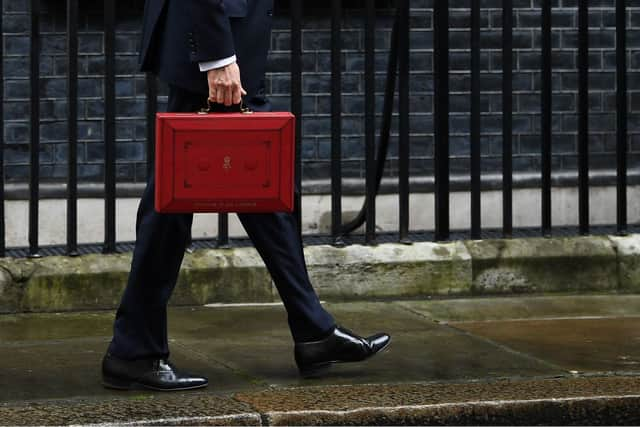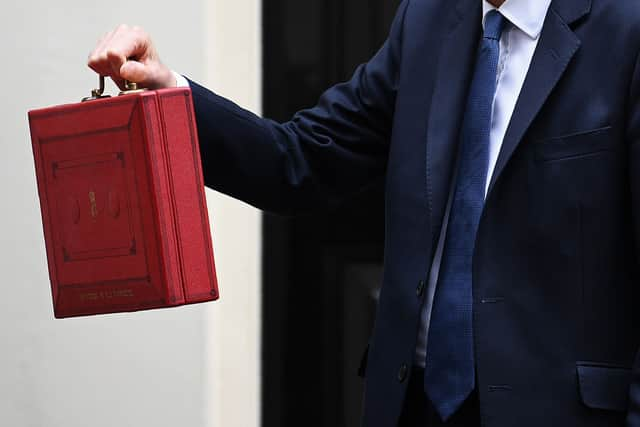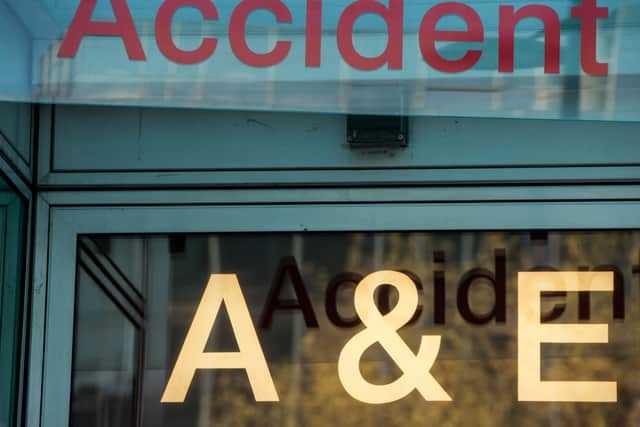Budget 2023 predictions: 9 key talking points ahead of UK Spring Statement - from pensions to energy support
This article contains affiliate links. We may earn a small commission on items purchased through this article, but that does not affect our editorial judgement.
and live on Freeview channel 276
With a major cost of living crisis ravaging UK household budgets, fears of a recession, and a war in Europe, the man in charge of the public finances, Jeremy Hunt, has a bulging in-tray to deal with.
Set to deliver his first Spring Budget this week, the Chancellor of the Exchequer is a man in demand. All manner of people, politicians, organisations and companies are lobbying him to loosen the nation’s purse strings or change government policy to make theirs and other people’s lives easier.
Advertisement
Hide AdAdvertisement
Hide AdThings have been made more difficult for Hunt by the continuing presence of high inflation in the UK economy and soaring interest rates. Jitters over the global banking system may also weigh on his mind ahead of his major speech to the House of Commons.
It comes after he delivered an Autumn Statement that significantly raised the UK tax burden as Hunt set himself strict fiscal targets on public spending. While the economic picture looks better than it did in November, with the UK still not in a recession and reports that the government has unexpected headroom on its balance sheet, it seems unlikely the Chancellor will loosen the nation’s purse strings.
So, what exactly can we expect to hear in the Spring Budget - and what are people calling for Jeremy Hunt to do?
When is the Spring Budget?
It may feel as though it has been only weeks since the Chancellor delivered his Autumn Statement. And that’s because it has been, with the fiscal speech having been delivered on 17 November 2022.
Advertisement
Hide AdAdvertisement
Hide AdTo add to the confusion, it was the third major announcement about the UK’s public finances in little more than a month. The mini budget delivered by Kwasi Kwarteng and Liz Truss in September was quickly followed by a bunch of major u-turns when Truss ditched Kwarteng for Hunt in October.


This time around, the year’s headline tax and spend announcement should be the only big fiscal event for at least six months. It is due to take place on Wednesday (15 March), and will be accompanied by a forecast from the Office for Budget Responsibility (OBR).
What will be in the Spring Budget?
We have already been given an idea of some of the new policies Jeremy Hunt will announce during the Spring Budget 2023. Here is a list of the four key things we know about so far:
- ‘Back to work’ measures
The Spring Budget is already being unofficially dubbed the ‘back to work Budget’ as the government has briefed that it wants to get parents and over-50s back onto the payroll.
Advertisement
Hide AdAdvertisement
Hide AdMore free childcare hours are mooted to be under consideration by the Treasury, with Hunt having already confirmed he is also looking into potentially reforming Universal Credit for parents.
The Chancellor is also likely to announce an adjustment to the pension lifetime allowance, which could make it more lucrative for early retirees to return to the workplace. Longer-term, he may also announce new plans to bring forward the raising of the state retirement age, as well as announce new rules on how the state pension is calculated.
- Energy bills
After significant pressure from cost of living experts, including Martin Lewis and the Resolution Foundation think tank, Jeremy Hunt appears to be set to announce a delay to the introduction of the higher rate of the energy price guarantee.
Bills were set to go up 20% to an average of £3,000 a year from 1 April, at the same time as the government energy bills support scheme was due to end. It was warned that this shock to households would not only damage people’s budgets, but could also affect their health.


Advertisement
Hide AdAdvertisement
Hide AdBut Hunt appears to have relented and looks set to announce the £3,000 limit will be delayed until the summer, by which time energy bills are predicted to have become cheaper anyway.
Alongside this announcement, Hunt will say households with prepayment meters will not face the same bill premiums as before. It comes after the force-fitting of the meters in vulnerable people’s homes came under the spotlight earlier this year.
- Defence budget
With a war raging in Ukraine and scathing reports about the combat readiness of the British armed forces, calls for the Ministry of Defence (MoD) to get more money have been growing.
Defence Secretary Ben Wallace reportedly wanted Jeremy Hunt to give him an extra £11 billion, while others have called for spending on the military to rise from 2% of GDP to 3%. But Rishi Sunak has said the department will get an additional £5 billion over the next two years.


Advertisement
Hide AdAdvertisement
Hide AdThis package will equate to an extra £1.98 billion this year and £2.97 billion next year, and will go towards the AUKUS pact, weapons for Ukraine and UK munitions improvements. Wallace said he is “delighted” by the news, but Tory chair of the defence select committee Tobias Ellwood said Russia and China would be “breathing a sigh of relief”.
- Alcohol duty
It also appears highly likely that we will be paying more for alcohol from August as the government introduces a new alcohol duty system and is considering hiking charges by a double-digit percentage.
The move could make wine much more expensive, while also cutting the price of canned gin and tonics. It was meant to come in from February but was delayed by Hunt in December.


What else could we hear in the Spring Budget 2023?
While we know some of the things the Chancellor will almost certainly announce on Wednesday, there are several other taxes and policies Jeremy Hunt is coming under pressure to address. Here is a quick rundown of some of the areas he may be forced to look at:
- Strike settlements
Advertisement
Hide AdAdvertisement
Hide AdWhile the government has been loath to bow to union pressure on public sector pay increases, it has suggested it could reform how public sector pay reviews work. It may also open up its coffers to provide backdated lump sums.
Several strikes are planned for Budget day and the government’s plans are likely to have to be generous for unions to stop the wave of industrial action that’s hit the economy since last autumn.
- Tax cuts
While Liz Truss’s short reign as Prime Minister is firmly in the UK’s rearview mirror, her influence continues to be felt on the Conservative backbenches. The Conservative Growth Group (CGG) - an organisation of 20 to 30 Trussite Tory MPs who support tax cuts - has called for corporation tax to be cut from a planned 25% to 19%.


It has also been joined by the RAC in calling for a continuation of the fuel duty freeze, which is due to expire on 23 March and would add around 5p a litre to pump prices. However, given Hunt set himself strict financial targets in his Autumn Statement, any large scale tax cuts - or effective tax cuts - are unlikely to make it into his speech.
- Green policies
Advertisement
Hide AdAdvertisement
Hide AdThe CBI and environmental groups, like Greenpeace, have previously urged the government to consider providing greater investment for insulation and renewable energy schemes.
Current funding pots, like the boiler upgrade scheme, have had little uptake so far and cannot be accessed by most households as they require significant funds to take advantage of. Not only would increasing support - either in the form of grants or loans - reduce the country’s carbon footprint, but it would also lower energy bills. Whether the Chancellor can find enough money within his self-imposed fiscal targets is another thing.
- Department budgets
With inflation still tearing through the UK economy at a near-record high rate, government department budgets are likely to have had a real-terms cut in recent months.
We have already seen the Ministry of Defence secure extra money from the Treasury, but it may be that other departments - most notably health and social care - also receive additional funds.


- Growth plan
Advertisement
Hide AdAdvertisement
Hide AdOne of the major criticisms of the Autumn Statement was that, whilst it was focused on firefighting in the wake of Liz Truss’s disastrous mini budget, it did not contain enough on how the Sunak administration would get the UK economy growing again.
Calls for a proper growth plan led Rishi Sunak to set out his five key goals for 2023 just after the New Year - although these were also criticised for being too vague and not ambitious enough. While the five targets are likely to crop up again during this budget, Chancellor Hunt may have to go further.
The Confederation of British Industry (CBI) wants to see a “permanent investment deduction” that allows firms to claw back money when they make investments in the UK. Such a move could add £50 billion to the UK economy (another 2% of GDP) by the end of the decade, the industry body says.
A similar scheme known grandly as the ‘super-deduction’ is set to expire in April, which the CBI fears will combine with the corporation tax hike to make the UK an unattractive place to invest.
Comment Guidelines
National World encourages reader discussion on our stories. User feedback, insights and back-and-forth exchanges add a rich layer of context to reporting. Please review our Community Guidelines before commenting.
